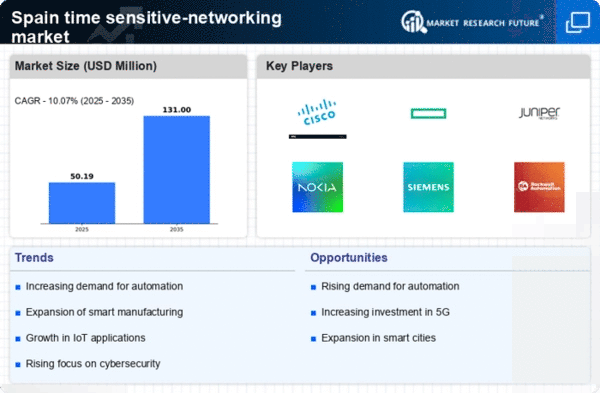Integration of IoT Devices
The proliferation of Internet of Things (IoT) devices in Spain serves as a catalyst for the time sensitive-networking market. As more devices become interconnected, the need for efficient data exchange and processing intensifies. Industries such as healthcare, agriculture, and smart cities are increasingly adopting IoT solutions that necessitate time-sensitive networking to ensure seamless operation. It is estimated that the number of IoT devices in Spain will exceed 50 million by 2025, creating a substantial market for time sensitive networking technologies. This integration not only enhances operational efficiency but also fosters innovation in service delivery, thereby driving growth in the time sensitive-networking market.
Emergence of Edge Computing Solutions
The rise of edge computing solutions in Spain presents new opportunities for the time sensitive-networking market. By processing data closer to the source, edge computing reduces latency and enhances the performance of time-sensitive applications. This trend is particularly relevant for sectors such as retail, healthcare, and transportation, where immediate data processing is crucial. As organizations increasingly adopt edge computing strategies, the demand for time sensitive networking technologies is likely to grow. The market could see a shift towards decentralized data processing, which may further drive innovation and efficiency in various industries reliant on timely information.
Advancements in Network Infrastructure
The evolution of network infrastructure in Spain significantly influences the time sensitive-networking market. With the rollout of 5G technology and the enhancement of fiber optic networks, the capacity for high-speed data transmission increases. This infrastructure development is crucial for industries that depend on low-latency communication, such as autonomous vehicles and smart grids. Reports indicate that investments in network upgrades could reach €2 billion by 2026, reflecting a commitment to modernizing communication systems. As these advancements unfold, the time sensitive-networking market is likely to benefit from improved connectivity and reliability, enabling more applications that require stringent timing requirements.
Focus on Smart Manufacturing Initiatives
Spain's commitment to smart manufacturing initiatives significantly impacts the time sensitive-networking market. The government promotes Industry 4.0 strategies, encouraging manufacturers to adopt advanced technologies that enhance productivity and efficiency. This shift towards automation and data exchange necessitates robust networking solutions capable of handling time-sensitive applications. As a result, the time sensitive-networking market is expected to grow as manufacturers invest in technologies that facilitate real-time monitoring and control. The potential for increased operational efficiency and reduced downtime positions time sensitive networking as a critical component in the evolution of Spain's manufacturing landscape.
Rising Demand for Real-Time Data Processing
The time sensitive-networking market in Spain experiences a notable surge in demand for real-time data processing capabilities. Industries such as manufacturing, transportation, and telecommunications increasingly rely on instantaneous data transmission to enhance operational efficiency. This trend is evidenced by a projected growth rate of approximately 15% annually in sectors utilizing time-sensitive applications. As organizations seek to optimize their processes, the integration of time sensitive networking solutions becomes essential. The ability to process data in real-time not only improves decision-making but also enhances overall productivity. Consequently, the time sensitive-networking market is poised for expansion as businesses recognize the value of timely information in maintaining competitive advantage.
















